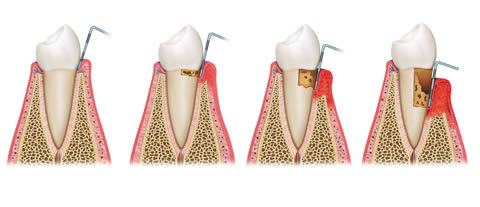What Should You Do If Your Gums Start To Bleed?

One of many symptoms, bleeding gums could indicate that you have gum disease.
It seems like a normal day; you get up and go to the bathroom to brush your teeth, because you always brush them well. This time though, when you spit into the sink after brushing, you notice that there seems to be quite a bit of blood in the saliva. Have you scratched your gums you wonder, but brushing later in the day, you notice the same thing and the alarm bells start to ring.
This isn’t an uncommon problem but it is a warning sign. Even people that consider that they brush their teeth well can suffer from this unless they have paid special attention to their gums as well. Bleeding gums is not the only symptom, but if they do bleed, there is every likelihood that you may have gum disease.
If you spot blood in your saliva after brushing your teeth, you should make an appointment at Bradley and Partners Dental & Implant Clinic as soon as you can to have it checked out.
Gum disease symptoms
While bleeding gums is one of the more obvious symptoms of gingivitis or periodontitis, there are a number of others too which include sore and/or inflamed gums, receding gums, wobbly teeth and persistent smelly breath. Gum disease can also be ‘silent’ and you may not notice any symptoms which makes it all the more important that you look after your gums on a regular basis, and we will come to that shortly.
Gingivitis and periodontitis
These are the two key stages of gum disease. Gingivitis is an earlier stage which can often be reversed and managed in a relatively straightforward manner. Periodontitis is a more advanced form that affects the bones that support our teeth as well as the gums. This can be much more difficult to treat and may also not be successful, potentially resulting in tooth loss.
Treating gingivitis
In order to treat gingivitis, the best thing that you can do is to make an appointment to see the hygienist at our Canterbury clinic and seek advice. They will be able to examine your teeth and gums and will discuss with you your current lifestyle and teeth cleaning habits. They may make suggestions as to how you can improve your oral health by, for example, quitting smoking and adding dental floss to your daily routine.
Sometimes, these things alone may be enough to reverse the problem. They will also professionally clean your teeth with a scale and polish procedure to remove hardened bacteria and minerals that attract even more bacteria, from the teeth and gum line. In most cases, they will recommend that you see them every six months. For some people, such as smokers and diabetics, they may recommend more frequent professional cleans to help keep your gums in good health.
Treating periodontitis
Unfortunately, treating advanced gum disease is not so straightforward, and whilst changing your lifestyle and cleaning habits may be a good thing, it is unlikely to reverse periodontitis, which, by its nature, will potentially have affected the roots of the teeth and the jawbone too.
There is only one treatment which can save teeth affected in this way and that is a ‘deep clean’, also sometimes known as ‘root scaling’. This is a very invasive procedure which may mean cutting into the gums in order to reach the roots of the tooth and surrounding bone in order to clean it. Although this can be successful, this is not always the case and you may still lose a tooth. The ‘secret’ then, is to maintain a healthy mouth and make sure that you have your mouth health monitored on a regular basis.
Preventing gum disease
As you can see from the above, undetected gum disease can cause a lot of problems, even including the loss of some of your teeth. It is therefore best avoided if possible. For most people this is actually easy to do with a few improvements to your cleaning regimen and regular professional supervision. Lifestyle changes like stopping smoking will also greatly improve your chances of avoiding it.
When you next brush your teeth, check the bristles. If they look worn or you think you have had the brush or brush head in the case of an electric one for more than three months, it is time to change it as soon as you can. When you brush your teeth, turn the bristles so that they reach towards the gums. This will help to remove bacteria and food particles from the gum line.
When you are out buying your new tooth brush, make sure too, to pick up some dental floss. This is a great way of removing trapped debris from between your teeth and near the gum pockets and adding this alone to your oral health regime will make a significant difference to your gums.
Finally, don’t see the hygienist as an ‘optional extra’. This is something that you should do every six months, however well you brush your teeth. It is a great way to keep your mouth healthy and will also help to remove some surface staining too.
Gum disease should not be ignored. It can have devastating consequences for your teeth and is increasingly being linked with other health issues too. To book your appointment with the hygienist at our popular Canterbury practice, please call Bradley and Partners Dental & Implant clinic today on 01227 463529.
